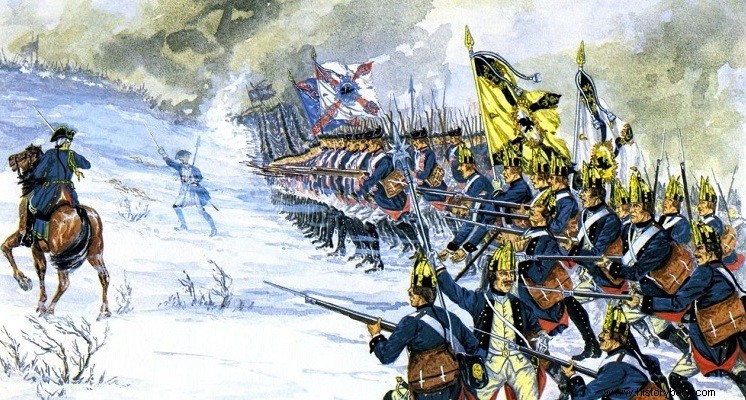
During the Seven Years War, the Prussian Army fielded 49 line infantry regiments of each type (musketeers and fusiliers). The numbering of the constitutions was derived from the order of their seniority. Some of them had been formed and joined service in other armies. Thus, their order of seniority was determined by the date of their joining the Prussian Army.
Of the soldiers who made up the infantry regiments, at least 1/3 were foreigners, coming mainly from Prussia's neighboring small German states. But there were others who came from France, Switzerland, Ireland, Italy, and even from the Ottoman Empire. Most foreigners served in the younger regiments of fusiliers, and there were almost entire regiments that had only mercenaries. Even the highest officers of the Prussian Army were foreigners.
Naturally, the connecting link of this motley military machine was none other than harsh discipline. According to Frederick the men were to fear their officers more than the enemy. There are many examples of blind devotion, to the point of death in duty and especially in Frederick himself.
In the battle of Mollwitz (1741) he was a French mercenary who, with self-sacrifice, saved Frederick's life. It was the Irishmen of the 19th Regiment who sacrificed up to one at the battle of Hokirk (1758), to enable their colleagues to withdraw, after the surprise attack of the Austrians. The 2/19th Battalion stubbornly defended the village church and when they ran out of ammunition charged the enemy with their lance!
Only discipline and strong unit spirit formed the link of the army. The strength of a disciplined infantry division of the time did not consist in individual action, but in its ability to act collectively, summing up the efforts of the men who comprised it. For this it is worth making a brief mention of the most famous Prussian infantry regiments and their action.
The 1st Musketeer Regiment was the oldest unit of the Prussian Army. It had been founded in 1615, shortly before the start of the Thirty Years' War. During Frederick's reign, the regiment fought in the Silesian Wars (1740-45). With the outbreak of the Seven Years' War (1756-63) the regiment fought in the bloody victorious Battle of Prague (1757), the famous Battle of Rosbach (1757), Luten (1757), the disastrous for the Prussian arms the Battle of Hokirch (1758 ), in Liegnitz (1760), Torgau (1760) and Bukersdorf (1762).
Another famous infantry regiment was the 3rd Musketeer Regiment of Analt Dessau. The regiment was formed in 1655. It took part in many battles. At the battle of Dresden (1760) the regiment fled. As punishment Frederick ordered the dishonorable removal of the men's swords. Three weeks later, on August 15, 1760, at Liegnitz, his men, determined to regain their lost honor, single-handedly charged the Austrian cavalry and put it to flight with the lance.
After this, Frederick himself congratulated the men of the 3rd and ordered their swords to be restored to them. "All is forgotten and all is forgiven, except this day," he declared to his men, who cheered gathered around him.
Also famous was the "grubby" 13th Musketeer Regiment, the famous "lightning and thunderbolt" regiment, whose four honorary commanders were killed between 1740 and 1762. Three of them were Prussian nobles who fell in battle. The fourth was Tsar Peter III of Russia, who was assassinated by the Orlov brothers and his wife Catherine the Great. Despite the misfortune of its honorary commanders, however, the fighting behavior of the regiment was not affected. The regiment particularly distinguished itself at the Battle of Prague (1757), led by the king's brother Prince Henry. The constitution was established in 1686.
The 15th Musketeer Regiment of the Guard was founded in 1688. From 1731 its honorary commander was Frederick himself. His 1/15th Battalion particularly distinguished themselves at the Battle of Molwich. Of his 800 men only 180 were still standing when the battle ended. The 2/15th and 3/15th Battalions distinguished themselves in every battle in which they took part and particularly in that of Rosbach. The 17th, 18th, 19th, 23rd and 24th Musketeer Regiments also belonged to the distinguished units of the Prussian infantry. The latter even had the honor of being led into the battle of Prague by his own honorary commander, the brave field marshal Kurt von Schwerin.
Frustrated by the Prussians' inability to break through the Austrian positions, the marshal seized the flag of the 24th and rode it forward on horseback, only to fall dead from enemy fire. But his men avenged his death, attacked and finally won. Of the fusilier regiments, the 35th and 49th stood out. The latter had been joined by men of the Engineer's gun. For this regiment was known as the Pioneer Regiment. Despite its "humble" origins and its "young age" - founded in 1758 - the regiment fought exceptionally well in the battles of Chondorf (1758) and Torgau (1760).
